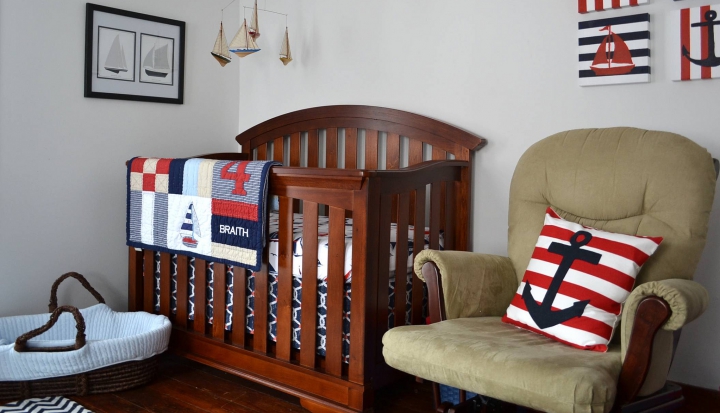When Katherine Brown experienced the stillbirth of her first child, Grace, during her 27th week of pregnancy, she struggled with the lack of support from her parish priest and faith community. Like many Catholic women confronting miscarriage and other forms of pregnancy loss for the first time, she was uncertain of what parish and faith resources were available to her and her family. “There was no guidance from our parish about how to handle this,” she recalls.
Katherine and her husband, Keith, wanted a funeral for Grace, who was diagnosed after her death with Cenani-Lenz syndactyly syndrome, a genetic disorder that causes severe bone malformation. But she says her priest was uncertain about whether this was allowed, citing a “lack of precedent.” Eventually, he agreed to perform the service, although not without some persuasion on the part of the Browns.
By the time of Katherine and Keith’s third pregnancy loss—the miscarriage of their son, Joe—they had come to understand that their experience after losing Grace was not an isolated incident; there is something lacking in the church’s overall response to families experiencing this kind of tragedy. After Joe’s death, “The priest never asked if we wanted a funeral,” Katherine says. And even though he knew she had miscarried, she says, “He never even came to the hospital.”
Katherine recalls that while she received incredible support from her female colleagues at the Catholic school where she works—“women who had had miscarriages themselves, who wrote me beautiful notes and gave me books that helped them get by”—she found nothing within her parish or diocese to help her and her family through their feelings of grief and loss. In fact, when she and other members of the parish’s Respect Life committee wanted to address prenatal diagnoses, which frequently prevent a woman from carrying a child to term, as a “life issue,” their priest responded by saying, “What is that?”
For Katherine, the question stung. But it wasn’t entirely surprising; miscarriage and pregnancy losses, as common as they are, remain one of the most neglected aspects of ministry within the church. Families affected by pregnancy loss are reaching out for support from their parishes and clergy, but too often they feel as if they are reaching into a void. Few priests are equipped to deal with this sensitive and painful topic, and most of the resources that do exist within the church focus on pro-life issues—not always the most helpful pastoral response to a family in mourning. While independent ministries are rising up to fulfill this unmet need, a more concentrated response is needed among priests, chaplains, and pastoral caregivers.
The church and miscarriage
The medical definition of miscarriage is the loss of a fetus before the 20th week of gestation, says Dr. Sheila Chhutani, a partner in Gyn/Ob Associates at Texas Health Dallas hospital. Miscarriages are remarkably common—sources differ markedly with respect to just how common, citing statistics ranging from 10 to 50 percent of all pregnancies, and this statistic doesn’t include stillbirths, such as the Browns experienced. And yet this widely experienced occurrence remains one of the least-talked about aspects of pregnancy and parenting, not just in the Catholic Church, but in society.
The Catholic Church is adamant that life begins at conception, and yet it doesn’t always treat pregnancy losses as a loss of life, particularly when a miscarriage happens early in a pregnancy, before a fetus is viable outside the uterus. Everyone from the pope to the parish priest talks about the fetus as a baby, says Melissa Veselovsky, an Arizona woman who has had two miscarriages, but almost no one is prepared to treat a miscarried or stillborn fetus as a child. “If we’re really serious about life issues,” Veselovsky says emphatically, “we have to look not just at abortion, but also at miscarriage. We can’t say an aborted life is a life that begins at conception if we don’t acknowledge the ones that are lost in miscarriage.”
And yet, says Veselovsky, when she suffered a miscarriage neither the funeral home nor her doctor treated her baby as a person. With her first baby, Veselovksy was informed of fetal demise at 12 weeks. “My body wouldn’t pass the baby, so I had to have a D&C,” or dilation and curettage, she remembers. In the midst of the traumatic procedure, it occurred to her to ask what would happen to the fetus. “The doctor never mentioned where the remains would go,” she says, “so I had to ask him, ‘What are you going to do with my baby?’”
She wasn’t satisfied with his answer. He told her it was going to the lab. She pressed for more information: What happened after that? “He said it would be incinerated,” she says, the emotion of the conversation, which happened more than a decade ago, still discernable in her voice. “I told him this wasn’t acceptable to me.” She demanded her baby’s remains. “Luckily, I’m a strong woman. I’m very outspoken. I was brave enough to say, ‘Wait a minute, that’s not okay. This is not something that’s unwanted. This is something that’s beloved. That’s not how you’re going to treat this life.’ ”
Dr. John Brehany, an ethicist at the National Catholic Bioethics Center and former executive director and ethicist of the Catholic Medical Association, says Veselovsky’s experience isn’t uncommon in many hospitals. But “parents should know they can have the remains back,” Brehany says, “and that the next step would be to contact a Catholic cemetery.” He adds that most Catholic hospitals have policies in place to support families “as best they can” when they suffer a miscarriage or stillbirth. These policies often include providing families with contacts at cemeteries and funeral homes who can help them cremate or bury their child.
While there may be some limited administrative support at Catholic hospitals, pastoral care after miscarriages is a different question. “Priests do not have a frame of reference for a lot of these things,” says Tracy Winsor, cofounder of Be Not Afraid, a nonprofit organization that ministers to families who have lost children. Pregnancy loss is generally seen, in both the church and the broader society, as deeply personal. And in addition to this, Winsor says, priests sometimes lack an understanding of the nuances of female grief.
Sometimes, what is healthy and normal female grieving looks really out of control to men, who have a tendency to want to shut it down or shut it out entirely. “It’s unfortunate because we’re relying upon them for pastoral care,” Winsor says, “and that can be painful if it’s your priest or pastor.”
All of this is not to say that priests don’t wish to better acknowledge the needs of women and families who are grieving. But it’s difficult when they receive little or no training in seminary. “You learn how to perform a wedding and say Mass when you’re a young priest,” says Father John McCormick, the rector of St. James Cathedral in Orlando, but when it comes to ministerial responses to miscarriage, “you’re left to your own devices. The practical way to deal with women who have miscarried is something each priest has to go through.”
For priests who look to the church for doctrinal guidance—what can they tell women and families about what the church teaches surrounding miscarried babies? What rites and rituals can they offer?—there aren’t a whole lot of guidelines that offer a foundation upon which this personal experience can be accumulated. “Seminary should encourage, perhaps, a general approach to loss,” says Father Peter Wojcik, codirector of the Department of Parish Vitality and Mission and chaplain at Lurie Children’s Hospital in Chicago. But even within the spectrum of grief and loss, miscarriage, he says, remains “one of those big tragedies in human life that doesn’t often see daylight.”
Partly that’s because, so often, there’s little or nothing physical to hold onto. “Parents who experience a perinatal loss experience a tremendous sense of grieving, especially if they were never able to hold or say goodbye to their child, born or unborn,” says Dr. Marie Hilliard of the National Catholic Bioethics Center.
Mourning rituals
Many Catholic parents are forced to find their own ways of grieving outside of the parish community. Sometimes this means finding a support group with women and families who have experienced the same thing. But sometimes parents are looking for more than a group of people to mourn with; they want the comfort the liturgy can provide and rituals that allow them to find comfort and give their grief to God.
Melissa Veselovsky and her husband were one of these families. After their doctor returned their baby’s cremated remains to them, the Veselovskys struggled to find a funeral home or priest that would offer a service for their child. “We got a lot of flippant answers,” Melissa says, with most funeral directors telling them, “Oh, it’s too young.”
They eventually buried their first child with little fanfare with a great aunt who had recently died. But after their second miscarriage, their priest told them of a local cemetery with a burial site designated specifically for the remains of miscarried children. “A priest was there. They had prepared a whole ceremony for us, and it was the most beautiful thing,” Melissa says. “I cried. It occurred to me that this is one of the reasons we’re told in the Bible to bury our dead. We need this closure.”
Claire Nicogossian, a Catholic psychologist in Rhode Island who has experienced pregnancy loss herself, couldn’t agree more about the importance of liturgy and ritual in gaining closure after a miscarriage or stillbirth. “Women need permission—they need to know that they can name a baby,” she says. “Sometimes we need to put something concrete on our grief. The ritual piece can be helpful, along with talking about it and knowing that grieving is an ongoing process; it never goes away, it just transforms.”
And, while funerals and Masses are an important part of this for Catholic women, these rituals can take place even in the absence of guidance from a priest. “They can hold onto the anniversary date, the date of loss. They can have a tree planted. They can have a ritual around that. Whether it’s writing a letter to the baby or having a Mass said, something needs to happen, because grief can be so amorphous,” says Nicogossian.
Chicago psychotherapist Kelley Kitley, who is also Catholic, agrees. In her practice she sees many women who, she says, “need a healing process that involves acknowledging the loss.” Often, “there’s a desire to have a ceremonial component—a memory box, some journaling, and saying good-byes after they have had a loss,” she says.
Nicogossian has her own rituals. Each Christmas, she and her husband buy clothes for the baby they lost, the size changing each year to match the age their child would be. Last Christmas, he would have been 10. The couple tells their four living children—all daughters—about Kevin, the child who isn’t with them. “We talk about him,” she says. “He had an impact, even though he may not be here. He was part of our family.”
This inclusion of siblings and husbands in the mourning process is crucial, say women who have experienced pregnancy loss. Nicogossian points out that miscarriage can be a stressor on even the healthiest union. “There is no fix” for pregnancy loss, she says, and when a couple is busy, especially if they have other children, it can be especially difficult to sit down and have a conversation about how to mourn and how to move on.
It is also important to include husbands and fathers, because their reactions and their way of grieving can differ so widely. Often they feel left out or like they need to suppress their grief in order to support their partner. Other times, men get frustrated at the lack of support being offered. Tracy Winsor, of Be Not Afraid, says, “I can’t tell you how many men I’ve seen say, ‘I’m out of here’—they leave the church” because of the lack of a pastoral response. For couples of different religious traditions, she says, the lack of a priest’s active involvement in ministering to the couple can have an even more damaging impact on a marriage and on perceptions of the church.
It takes a village
The church must find a way to support families who have lost their unborn children, both through better pastoral care and established rituals and liturgies that give comfort. But in the meantime, in the absence of any concerted and committed pastoral response, many women who have experienced pregnancy loss are establishing ministries of their own that respond to this gap in pastoral care.
One of these women is Winsor, who founded Be Not Afraid with Sandy Buck about 14 years ago. Winsor, who lost two children, Gabriel and Thomas, describes herself and Buck as “a couple of wacky pro-life Catholic women.” When they started the organization, a peer support service for women who have suffered a miscarriage or stillbirth, they thought most of the referrals would come from priests and churches.
That hasn’t been the case. Instead, women have come referred from hospitals and word of mouth, and, increasingly, internet searches. Families affected by pregnancy loss are reaching out for support, Winsor says, and so often they find themselves alone. One of the most important interventions, Winsor says, is to simply show up. “If you love these people you have to go to that baby. You can’t not step into that moment to validate that life.”
In Charlotte, North Carolina (where Be Not Afraid is based) people are starting to step up, including, increasingly, priests. Winsor and other members of Be Not Afraid facilitate trainings for clergy and laypeople to identify what can and should be done for families affected by pregnancy loss, preparing priests for the kinds of situations they are likely to encounter when they walk into a hospital room to provide comfort. “It’s such an awkward experience,” Winsor acknowledges. “In crisis, you have to be so delicate and careful. Those moments, you can never go back. Christ has to show up.”
For priests who find themselves in this uncomfortable pastoral situation, Father Berg notes that priests can do “many things pastorally.” He suggests praying with the couple, including the Order for the Blessing of Parents after a Miscarriage, found in the Book of Blessings, and celebrating Mass for them. Dr. Brehany of the National Catholic Bioethics Center agrees, adding that women who have experienced miscarriage and their husbands should still be treated as parents during church events—whether Masses or otherwise—where parents are being honored, such as Mother’s Day and Father’s Day.
Winsor points out that while a sense of empathy and the skills to negotiate this delicate tragedy is a pastoral skill that comes with time, it is equally important for priests to be knowledgeable about the practical considerations at hand. Many families will want to know what their next steps are. “Burying the dead is one of our corporal works of mercy,” Winsor says. “You shouldn’t just have to leave your baby at the hospital.”
For priests and pastoral caregivers looking for a place to start learning about the options for post-loss, Be Not Afraid can help, at least in the Charlotte area. They have a network of funeral directors who perform cremations, cemeteries that will accept cremains, and priests who can provide ongoing counseling or referrals for professional and peer-based support.
But what is needed are networks like this across the country. Pregnancy loss is difficult for everyone involved, says Winsor, and you can’t wait to address it at the parish level until a grieving parent reaches out. “You have to have a plan and response,” she says. “Hospital visits are part of pastoral care; it can be a deacon or lay woman who’s comfortable.” Winsor also suggests developing other pregnancy loss ministries, such as written materials that offer tangible resources, or spiritual comfort that’s available to grieving families.
The bottom line, Winsor says, is to do something, to not let miscarriage and pregnancy loss go unnoticed. Pastoral care lets grieving mothers and families know that Christ is still there, even in their pain and suffering. From there, healing can come.
This article also appears in the November 2016 issue of U.S. Catholic (Vol. 81, No. 11, pages 30–35).
Image: Flickr cc via tjortenzi2012













Add comment